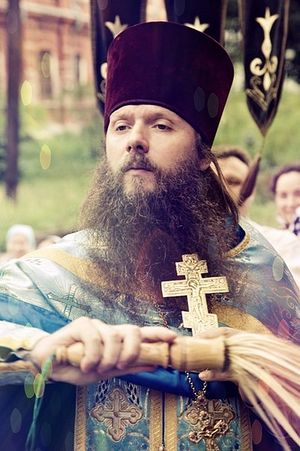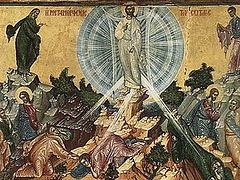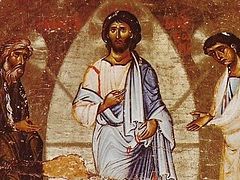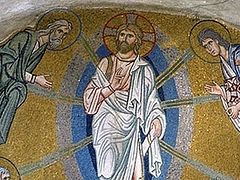Archpriest Artemy Vladimirov speaks on the spiritual meaning of the feast of the Transfiguration of the Lord, on our ascent following after Christ, about the event of the feast and about why namely Moses and Elijah appeared to the Savior, and about how to prepare ourselves for and how to pass the day.
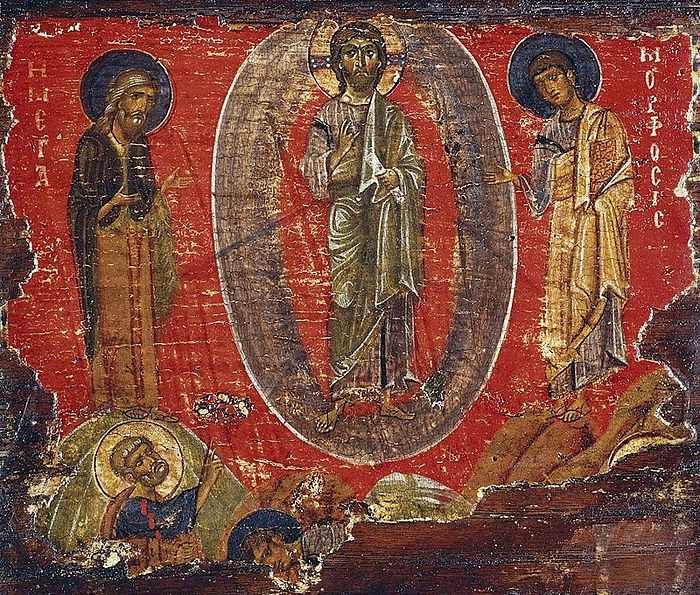 12th century Byzantine icon of the Transfiguration of the Lord
12th century Byzantine icon of the Transfiguration of the Lord
“Thou wast transfigured on the mount O Christ God …” Who does not remember the opening words to the tropar of this feast among the Great Twelve of the Transfiguration of the Lord?! Then upon Mt. Thabor the Savior, yet in the deep of night, accomplishing this ascent with the three most devoted and diligent of His disciples—John—the apostle of love, his brother James and the impetuous Peter—conversed with the Heavenly Father, and the disciples, having slumbered, suddenly saw the unfathomable: how the countenance of Christ radiated brighter than the light of the sun, and His garments became white as snow, transcending even the purity of the snow lying upon Mt. Carmel. And no launderer on earth, notes the Evangelist, can whiten fabric such as was the pure garment of Christ (cf. Mark 9:3). The disciples, when by the will of God their spiritual vision was unfurled, saw the glory of the Lord which the Son always possessed as did the Father, they being with Him of one essence according to the flesh. But here human nature, inseparably and indissolubly united with Divinity, shone through—as a piece of metal placed in the midst of fire, glowing, itself beginning to emit light and warmth as if becoming fire, but without having transformed its earthly nature.
The Feast of the Transfiguration… It is by the ancient holy fathers, and Russian preachers, and poets of the Silver Age hailed, as it itself signifies the beginning of the Russian autumn. After all, it is not accidental that according also to Greek tradition the people bring to the church fruits earthly and the first-fruits of the harvest, and priests, above all sprinkle apples, pears, and grapes as was customary in the Peloponnese and in Cherson, reading special prayers for the faithful, supplicating the Lord God to illumine their hearts with the beams of knowledge of God, that their hearts would be filled with spiritual blessings, a symbol and material expression of which are these earthly fruits, as if speaking of an imperishable paradisaical life, to which we all are summoned through spiritual ascent up Mt. Thabor, through unification with Christ the Savior in the Sacrament of Communion. And indeed, dear friends, of the feast of the Transfiguration speak the Sacred Scriptures of the Old and New Testaments, in regard to us as children of the Church, who the holy apostles call children of the light and sons of the Kingdom. They looked unto him, and were lightened: and their faces were not ashamed (Ps. 33:5). Taste, brothers and sisters, on the day of Transfiguration from the holy eucharistic cup the All-Pure Body and Blood of our Savior. Taste and see that the Lord is good. And what will we see? People will see around us the light of the Heavenly Father, about which the Savior speaks so clearly and lucidly: “Let your light [the Thaboric light—Fr. Artemy] so shine before men, that they may see your good works, the beauty of your soul and body illumined by the Holy Spirit, and glorify your Father Which is in heaven” (cf. Mt. 5:16).
On the day of the Transfiguration, bearing, as the apostles gentle, meek, and pure of heart, Divine grace, flowing from the summit of Mt. Thabor, we begin to understand why the preeminent Apostle Paul call Christians “light,” beaming in this perverse world. The feast of the Transfiguration speaks to us of the joyous import of spiritual podvig. After all, the purpose and honor of the spiritual calling in Jesus Christ consists in nothing other than the acquisition of the grace of the Holy Spirit, in the willingness and ability to divulge the petals of your soul, embracing these Divine rays, the source of which is the ineffable Sun of Love, or Sun of Truth in the language of the Prophet Malachi—our Lord and God Jesus Christ.
Remember, dear friends, the circumstances of this marvelous and mysterious feast, to ascend to spiritual perception which is not so simple, but, of course, is possible if we, like little chicks, gather under the wings of our Mother the Church, and she through her hymnographers and song-writers: Kosmas Mauima, St. John Chrysostom, and St. John of Damascus—in tropars and hymns of the feast (it’s very necessary to very attentively listen, and not be looking around), having purified our perception, raises us to comprehension of the Thaboric mystery. Give attention that three of the disciples followed relentlessly behind the Lord as he mounted this mountain. "And why didn’t they take Judas?" perhaps asks someone among us. And because, answer the interpreters of Holy Scripture, that red-bearded betrayer was quite lazy and pampering of the flesh. He longed to sit with the Messiah in His Kingdom, which, however, he imaged as purely earthly, but couldn’t find the time to arouse himself when the Lord, having knocked at the upper chamber where rested the apostles, called the heartiest to follow after Him. So we must to make even some effort, to labor even a little, that the 6th/19th of August would not turn out to be to us irrelevant, not turn out to be disappointing and unfulfilling, because without toil we won’t pull out any fish from the pond.
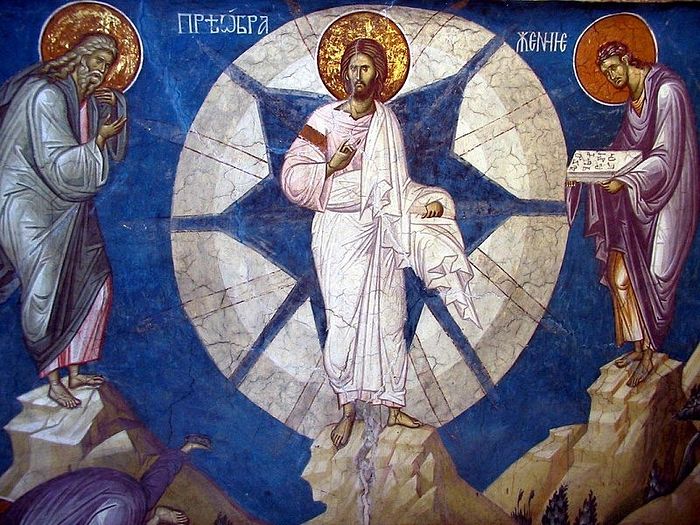 Serbian fresco of the Transfiguration of the Lord
Serbian fresco of the Transfiguration of the Lord
Think about how difficult it was for the apostles to follow after Christ. If you’ve ever been on Mt. Thabor, then, probably, you can guess that there was then no winding road, no highway, along which cabbies now for a few shekels or five dollars would deliver you to the apex, where you can partake in spirit in the great mystery of the Transfiguration. It was necessary to ascend on foot, and that means through the thorns and thickets. Maybe there was some kind of footpath along which shepherds led their sheep, but, obviously, the rise was a minor feat, which the apostles did unhesitatingly bear, not wishing to lag behind their Teacher. So we, dear friends, must already a few days before the Transfiguration gird up our loins a bit, enter into battle with the earthly and conceited thoughts, lay aside all worldly cares, especially garrulity connected necessarily with judgment, and more assiduously apply ourselves to the reading of Holy Scripture which illumines not so much the brain as the soul, inspiring and making one able to think about God, to stretch towards Him, to meditate upon Him and to pray to Him.
And so, finding themselves there on the pinnacle, Peter, James and John hearkened to what was transpiring. And of a sudden seeing the illuminated visage of the Lord, they with fear and trembling and with dread beheld Moses and Elijah. Moses—the Lawgiver, Elijah—he who will precede the Second Coming of Jesus Christ before the world’s nearing end, the prophet-zealot. Why, you ask, did precisely these two Old Testament holy ones, and not someone from among the judges or ancient warriors, like Joshua the son of Nun, face the Lord and conversed with Him? Obviously, the innermost meaning of the manifestation of namely these two great representatives of the Old Testament consists in the following: once, humbly inclining his head before the Lord, Moses, him who brought from Sinai the Ten Commandments to the human race, spoke with Him as a child with his Father, as a student with his Teacher. From here it follows that Christ is the Founder of the Old, just as of the New Testament. Christ is not the rival of the fatherly commandments, but He is the Lord and Judge, and He came to fulfill the Law and abrogate its ritualistic part, leaving the moral content. And Elijah the zealot who, as you remember, was able even with fire to meet brazen blasphemers attempting on the life of the fiery prophet, and, communing with Christ, to thereby bear witness to the apostles (and they were people, after all, literate and understanding) that before them—the apostles, Elijah, and Moses—was the long-awaited Messiah, the hope of tongues, He Who came to free Israel not so much from the foreign Roman domination as from the tyranny of the devil, from the domination of the passions, to shatter death itself, paving a path new and living to Resurrection.
And then descends the luminous cloud, in which hide Elijah and Moses, Christ alone remaining. And the apostles—recall the icon of the Transfiguration—reeling from fear, froze… Orthodox Tradition quite picturesquely depicts the disciples: on all fours spreading their arms and legs like a frog, if it’s possible to express myself such… The apostles, from this Divine light falling face down, hear the voice of the Heavenly Father Himself: This is My beloved Son; hear ye Him. Forever they—Peter, James, and John—conceal within their souls this sweet but fearful for feeble human nature voice of the Heavenly Father. And one of them, Peter, in his epistle subsequently will speak about this voice descended from resplendent gory—a voice which witnessed to the Divine Sonship and Divinity of the Lord Jesus Christ.
Coming down from the mountain, the apostles yet bore within themselves this effulgence of heavenly fire. And the face of Christ shone brilliantly such that the people dashed toward the Savior Who forthwith upon descending from the mountain accomplished the miraculous dead of healing the demoniac youth, having said to his infelicitous father: If thou canst believe, all things are possible to him that believeth. So to us comes the feast of the Transfiguration; may God grant us to confess and commune of the Mysteries of Christ, that we might not be sideline observers, but participants in the Divine Liturgy, and, having tasted of the sweet life of the future age, having been transfigured by a wondrous transfiguration, we might be penetrated by the rays of Divine glory and acquire a blessed sonship in Christ. We, like Peter, will not want to leave the church.
Remember how Peter, not understanding what he was saying, from an overabundance of supernatural joy said: “Lord, it is good for us to be here! Let’s place three canopies—three tents: for Thee, Moses, and Elijah. Only don’t return to that vain, brutish, and evil world, where, for Thee, Lord, wait the haughty Pharisees and the cunning Sadducees, seeking Thy death. Remain here forever!” However, this request of Peter’s was not granted. Why? Because the Savior, having demonstrated His Divine glory to the disciples, prepared the path to His Cross, reassuring His devotees that the suffering which was to meet the Savior in the Garden of Gethsemane and in Jerusalem was not involuntary.
Christ is not an unwitting sacrifice of Golgotha flour, but it was His own will as the God-Man that from obedience to the Heavenly Father and from love for the perishing human race He would ascend upon the Cross to, having tasted the bitter excruciating death, defeat it and eliminate it by His Resurrection. And on this Gethsemane night they, the apostles, all, except for John the Theologian, dispersed, as children frightened by the ferocity of the faces of Judas and the temple guards, but by the Resurrection they remembered—they remembered everything. They recalled those marvelous hours upon Mt. Thabor. And with great tenacity and joy they to the whole universe announced the good news of faith in Jesus Christ, true God and true Man, Who joins us, His children, to imperishable, life-giving and curative Divine grace, enlightening our minds, our mental faculties, assuaging our hearts, driving away from our souls despondency and sorrow, and making our very bodies an obedient instrument of our rational souls.
We talk a lot, but nothing is said if we do not talk about the internal meaning and greatness of this wonderful and beautiful autumn feast. And I very much hope, dear friends, that no one from among us will deprive himself by foolishness or by vanity of this incomparable joy of Divine fellowship, but that everyone, as far as his strength allows, will climb up Mt. Thabor—climb not by bodily feet, but in thought, in feeling, in order to stand before, on this glorious feast, Christ, our Sun, in Whom is nary a spot.

